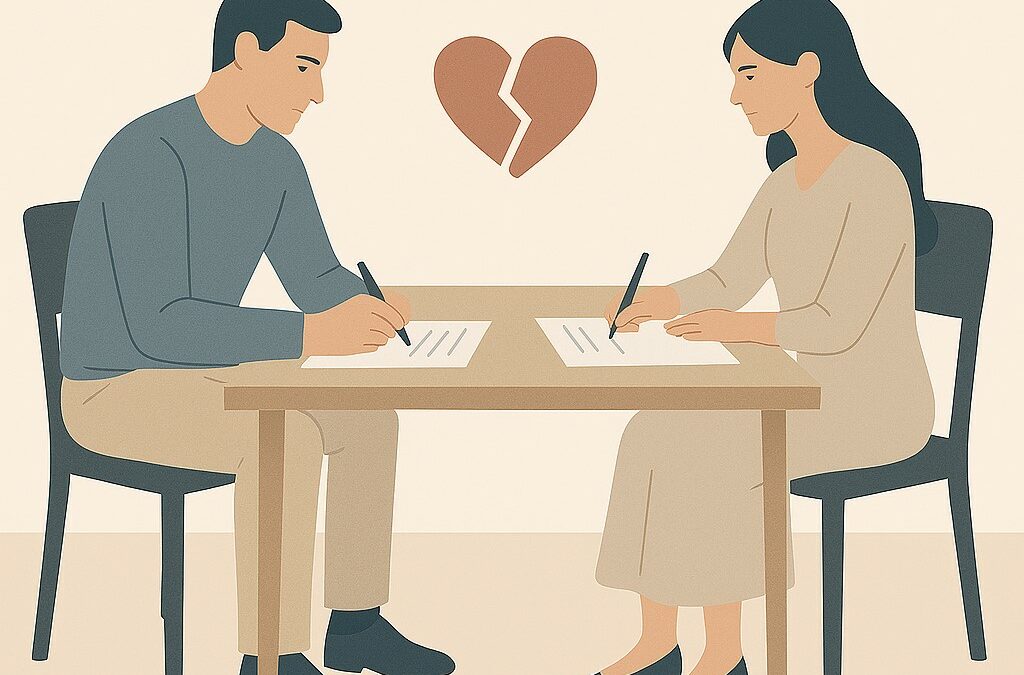Divorce by mutual acceptance (sometimes called “accepted divorce”) is one of the main forms of contested divorce in France.
This procedure allows spouses to jointly acknowledge the breakdown of their marriage without having to reveal the reasons for their separation.
This article explains the conditions, procedure, consequences, and its relationship with the other types of divorce.
1. What Is Divorce by Mutual Acceptance?
Divorce by mutual acceptance is governed by Article 233 of the French Civil Code.
It may be requested by either spouse individually or jointly, provided that both agree on the principle of ending the marriage, regardless of the circumstances that led to the breakdown.
2. Conditions for Obtaining Divorce by Mutual Acceptance
2.1. Forms of Acceptance
The acceptance of the principle of divorce can occur at any time during the proceedings, through several methods recognized by law since the January 1, 2021 reform:
-
-
- Court record of acceptance during the provisional measures hearing: the judge records the agreement, signed by both spouses and their attorneys.
- Individual declaration of acceptance annexed to the pleadings after the case has been filed, outside the provisional measures hearing.
- Private agreement countersigned by attorneys, signed within six months preceding the divorce petition or during the proceedings.
-
Important: The agreement must explicitly state that the acceptance is irrevocable, even on appeal.
2.2. Irrevocable Nature of Acceptance
Once given, acceptance of the principle of divorce cannot be withdrawn, even by way of appeal, except in cases of defective consent (error, fraud, duress).
3. Procedure and Relationship with Other Types of Divorce
Divorce by mutual acceptance is one of the four main forms of divorce in France:
-
-
- Divorce by mutual consent (agreement on both the divorce and its consequences)
- Divorce by mutual acceptance (agreement on the divorce but not necessarily on its consequences)
- Divorce for irretrievable breakdown of the marriage
- Fault-based divorce
-
It is possible to change the legal basis during the proceedings — for example, to switch from divorce for fault or for irretrievable breakdown to divorce by mutual acceptance if both spouses agree.
Unlike divorce by mutual consent, there is no requirement to reach an agreement on property division, financial arrangements, or child-related matters before the divorce is granted.
4. Consequences of Divorce by Mutual Acceptance
4.1. Scope of the Judgment and Right of Appeal
The court grants the divorce solely on the basis of the spouses’ acceptance, without providing additional reasons.
Appeal is possible only on the consequences of the divorce (property division, spousal support, child custody, child support, compensatory allowance, etc.), but not on the principle of divorce itself.
4.2. Financial Consequences
-
-
- Date of patrimonial effects: In contested divorces (mutual acceptance, irretrievable breakdown, or fault), the filing date determines the separation of the spouses’ assets, unless either spouse requests that the effects be backdated to the date they ceased living together and collaborating.
- Liquidation and division of marital property: The spouses may submit property division agreements to the judge for approval. The judge ensures that the interests of both spouses and any children are protected before homologating them.
- Compensatory allowance: Either spouse may request a compensatory allowance to offset the economic disparity created by the divorce.
- Other financial consequences: The court may grant or deny damages and generally orders that legal costs be shared unless decided otherwise.
-
4.3. Child-Related Consequences
-
-
- Parental authority and child residence: The judge rules on the children’s habitual residence and the exercise of parental authority.
- Best interest of the child: All decisions must comply with the principle of the child’s best interests.
-
Conclusion
Divorce by mutual acceptance allows spouses to move toward dissolving the marriage more quickly, without having to reveal the reasons for their separation.
It provides greater legal certainty — acceptance is irrevocable except in cases of defective consent — and limits litigation to the consequences of divorce (children, property division, finances).
Appeal is therefore limited to these matters.
This option provides a practical path for couples who cannot reach a full agreement but wish to formalize their separation in a calm, legally secure way, while respecting each spouse’s rights and the best interests of the children.
For legal advice tailored to your situation, do not hesitate to schedule an appointment.
© Photo : AI
